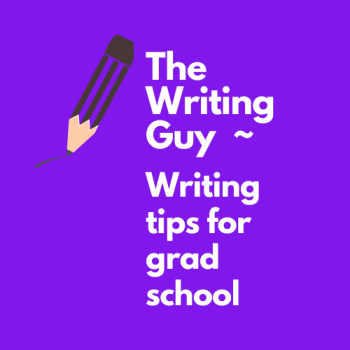This page collects together my workshop materials on the following essential graduate writing topics:
- Structuring arguments
- Reading like an academic writer
- Constructing research papers
- Writing about data
Taken together with my pages on grammar, literature reviews, overcoming writing anxiety, writing to your audience, and LRS 1-3 (i.e., style & clarity, arguments, and intros & problem statements), these materials constitute a kind of “mini-course-of-study” on successful writing for graduate school.
They also represent a sort of “greatest hits” in terms of what students frequently ask me about (and, consequently, what materials they find most useful).
Essentials of Grad Writing 1: Structuring Arguments
Topics covered: Intros; subheadings; signposting; “old-to-new” information flow; general-to-specific structure; problem-process-solution texts
Description: This presentation discusses common and effective methods for structuring arguments in academic papers (such as class assignments, journal articles, and thesis proposals). It discusses structure at both the paragraph and “whole-paper” levels, focusing on general-purpose advice that is applicable to all disciplines.
Watch a video of the workshop (April 14, 2021):

View/download the PowerPoint slides:
And here’s the accompanying handout:
Here are some useful additional resources on the topics discussed in this workshop:
Purdue OWL: Organization and Structure: Discusses outlining, reverse outlining, and signposting.
AWE: The Given-New Principle: A useful tutorial on going from old to new topics in your academic writing.
Information flow in sentences: Discusses old-to-new information with a focus on engineering writing
University of New South Wales: Old to New Another good resource on old-to-new information flow.
My pages on Arguments and Audience (particularly the workshop slides) also discuss some important concepts about structuring arguments.
Essentials of Grad Writing 2: Reading Like An Academic Writer
Topics covered: Reading in graduate school; reading for homework vs. “reading like a writer”; pre-reading questions; questions to ask during reading; genres; writing while reading
Description: This presentation shows graduate students how to get the most out of reading academic papers in their disciplines. It discusses how to learn discipline-appropriate voice, style, and structure by reading academic papers (“reading with a writer’s eye”), as well as how to read research papers more quickly and efficiently.
View/download the PowerPoint slides:
Accompanying handouts:
(1) Miriam Sweney: How to read for grad school:
(2) Swales & Feak: Article Analysis:
(3) Swales & Feak: Language focus:
(4) Patrick Russell: Short version of the Belcher test (from Wendy Belcher):
See also the “Literature Reading Strategies” section of my Lit Reviews page.
Last, but definitely not least, the original paper that inspired this workshop (and upon which much of the workshop is directly based) is freely available online: Mike Bunn (2011). How to read like a writer. It’s a fun and informative read, and I recommend it enthusiastically.
Essentials of Grad Writing 3: Constructing Research Papers
Topics covered: “What we can learn from restaurant menus”; Introduction, Methods, Results, and Discussion (“IMRD” or “IMRAD”) format; abstracts
Description: This presentation discusses “whole-paper”-level structure for research papers. I’m using the term “research papers” broadly to include class papers, journal articles, and theses/dissertations. Some version of the IMRAD structure is commonly used in all of these paper types. Literature reviews are often discussed (and you can visit my page on them here), but students may also struggle with the other components of research papers and theses: the introduction, methods, results, and discussion sections. This workshop will address these components, along with a brief recap of literature reviews. Questions like “How do I know when I’m being too repetitive?” and “How do I avoid including too much discussion in my results section?” will be addressed.
View/download PowerPoint slides:
Accompanying handouts:
(1) Pre-activity: Bad Menu– This handout is an example of a restaurant menu that “fails” by not meeting the expectations that readers have about what menus should do and how information on them should be organized. See how many problems you can identify with this bad menu.
(2) All workshop activities in order — This handout provides all the materials that are referenced during the presentation, so it should be used in conjunction with the slides above.
(3) Post-activity: Todorovic (2003) Sample IMRAD paper — This “handout” is a peer-reviewed IMRAD paper about IMRAD papers. It’s both entertaining and informative.
Finally, this excellent Research Proposal Guide from The Thesis Whisperer is a must read:
Essentials of Grad Writing 4: Writing About Data
Topics covered: Data commentaries; strength of claim; location statements; highlighting statements; conclusions & implications; graphs
Description: This presentation provides tips for discussing data in research papers, including theses and dissertations. It does not cover mathematical techniques of data analysis (which can be learned elsewhere), but instead discusses effective ways to write about research data, including the use of qualifying statements; expressing likelihood; describing graphs and figures; and discussing problems and limitations.
View/download PowerPoint slides:
Accompanying handout:
